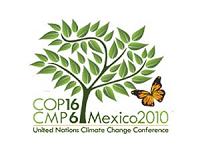| . |  |
. |
Cancun, Mexico (AFP) Dec 12, 2010 India has emerged as a new global power on climate change, with major nations voicing praise -- and surprise -- at New Delhi's agile diplomacy that helped produce a deal in Cancun, Mexico. Jairam Ramesh, India's outspoken environment minister, was instrumental in breaking a deadlock over how to verify nations' climate actions and, for the first time, said that his country would consider a binding deal in the future. Ramesh told reporters in the Caribbean beach resort that India needed to change with the times as it seeks a greater global role and the world inches toward a new comprehensive agreement on fighting climate change. "India is moving ahead. India is being progressive. It can only attain global leadership by expanding its negotiating space," Ramesh said. "A negotiating position must evolve over time." Ramesh faced criticism at home, with the political opposition and some environmental activists accusing him of selling out India's position to please the United States, which has warming relations with New Delhi. Indian Prime Minister Manmohan Singh also played down the statements by Ramesh, who has found himself in trouble before over his plain-spoken remarks overseas. But some climate negotiators and experts saw his comments as a major -- even historic -- shift by India, which since its independence in 1947 has fiercely fought global agreements seen as imposing mandates on the developing world. "India's stance in climate negotiations has been much more open and much more active," French Ecology Minister Nathalie Kosciusko-Morizet said. "This is something that is new and very encouraging." Ramesh drafted a compromise on verification, an acrimonious dispute during last year's chaotic Copenhagen summit with developed nations insisting that all nations offer proof that they are meeting pledges to fight climate change. Ramesh proposed that all countries responsible for at least one percent of carbon emissions blamed for climate change report their actions internationally every two years, but not face repercussions for falling short. The final agreement in Copenhagen was more vague, but delegates said Ramesh's proposal helped bridge the gap between the United States and China, which stood on opposite poles over the dispute. Ramesh's compromise offer was "very, very constructive," said Todd Stern, the chief US negotiator. "It did most of what we thought needed to be done and had the benefit of not being ours," Stern said. "Diplomatically, that can be a good thing." While Ramesh's role was among the highest profile, other major developing nations also played a more active role in Cancun. China, stung by accusations that its intransigence ruined the 2009 Copenhagen conference, conducted an image makeover. China, the world's largest carbon emitter, highlighted its efforts on climate change and promised flexibility on the verification issue. Brazil teamed up with Britain to solve a dispute over whether to extend the Kyoto Protocol, coming up with language that was acceptable to Japan -- which considers the treaty unfair by not including the United States and China. South Africa also played a role, with President Jacob Zuma among the few heads of state to visit. The next major climate talks -- which some hope can seal a comprehensive deal -- is slated for Durban at the end of 2011. But the highest praise -- from almost all countries in the talks -- was reserved for host Mexico. Foreign Secretary Patricia Espinosa painstakingly included all countries in talks, turning a page on bitter divisions in Copenhagen. Dessima Williams, a diplomat from Grenada who heads the bloc of small island states that fear climate change threatens their very survival, said the Cancun talks showed a renewed influence "of the global South." "Mexico is leading the way in the revival of an invigorated international system," she said. The Cancun talks set up a "Green Climate Fund" to administer billions of dollars in climate aid promised for worst-hit poor countries. The deal also called for deep cuts in emissions to hold back temperature rises at two degrees Celsius (3.6 Fahrenheit) above pre-industrial levels.
Share This Article With Planet Earth
Related Links Climate Science News - Modeling, Mitigation Adaptation
 Cancun reignites climate talks flame
Cancun reignites climate talks flameCancun, Mexico (AFP) Dec 11, 2010 A climate deal reached in Mexico has revived faith in UN-backed talks after last year's debacle in Copenhagen, but environmentalists warn the new measures are far less than what the planet needs. After two exhausting weeks meeting in the resort of Cancun, more than 190 nations hammered out an accord that puts into operation a new climate fund administering billions of dollars in promised aid ... read more |
|
| The content herein, unless otherwise known to be public domain, are Copyright 1995-2010 - SpaceDaily. AFP and UPI Wire Stories are copyright Agence France-Presse and United Press International. ESA Portal Reports are copyright European Space Agency. All NASA sourced material is public domain. Additional copyrights may apply in whole or part to other bona fide parties. Advertising does not imply endorsement,agreement or approval of any opinions, statements or information provided by SpaceDaily on any Web page published or hosted by SpaceDaily. Privacy Statement |